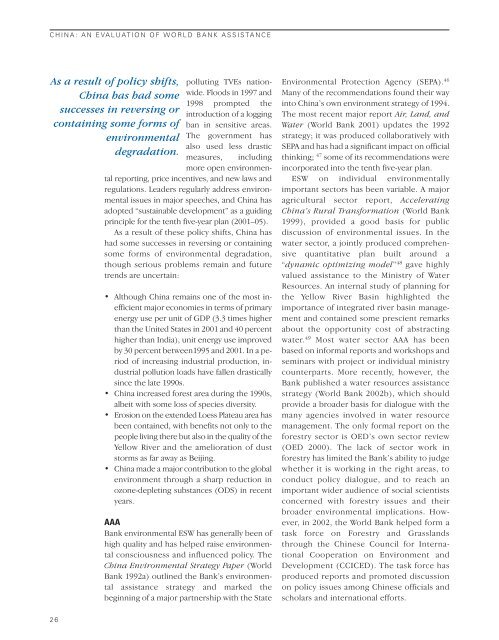Download Report - Independent Evaluation Group - World Bank
Download Report - Independent Evaluation Group - World Bank
Download Report - Independent Evaluation Group - World Bank
- No tags were found...
Create successful ePaper yourself
Turn your PDF publications into a flip-book with our unique Google optimized e-Paper software.
CHINA: AN EVALUATION OF WORLD BANK ASSISTANCEAs a result of policy shifts,China has had somesuccesses in reversing orcontaining some forms ofenvironmentaldegradation.polluting TVEs nationwide.Floods in 1997 and1998 prompted theintroduction of a loggingban in sensitive areas.The government hasalso used less drasticmeasures, includingmore open environmentalreporting, price incentives, and new laws andregulations. Leaders regularly address environmentalissues in major speeches, and China hasadopted “sustainable development” as a guidingprinciple for the tenth five-year plan (2001–05).As a result of these policy shifts, China hashad some successes in reversing or containingsome forms of environmental degradation,though serious problems remain and futuretrends are uncertain:• Although China remains one of the most inefficientmajor economies in terms of primaryenergy use per unit of GDP (3.3 times higherthan the United States in 2001 and 40 percenthigher than India), unit energy use improvedby 30 percent between1995 and 2001. In a periodof increasing industrial production, industrialpollution loads have fallen drasticallysince the late 1990s.• China increased forest area during the 1990s,albeit with some loss of species diversity.• Erosion on the extended Loess Plateau area hasbeen contained, with benefits not only to thepeople living there but also in the quality of theYellow River and the amelioration of duststorms as far away as Beijing.• China made a major contribution to the globalenvironment through a sharp reduction inozone-depleting substances (ODS) in recentyears.AAA<strong>Bank</strong> environmental ESW has generally been ofhigh quality and has helped raise environmentalconsciousness and influenced policy. TheChina Environmental Strategy Paper (<strong>World</strong><strong>Bank</strong> 1992a) outlined the <strong>Bank</strong>’s environmentalassistance strategy and marked thebeginning of a major partnership with the StateEnvironmental Protection Agency (SEPA). 46Many of the recommendations found their wayinto China’s own environment strategy of 1994.The most recent major report Air, Land, andWater (<strong>World</strong> <strong>Bank</strong> 2001) updates the 1992strategy; it was produced collaboratively withSEPA and has had a significant impact on officialthinking; 47 some of its recommendations wereincorporated into the tenth five-year plan.ESW on individual environmentallyimportant sectors has been variable. A majoragricultural sector report, AcceleratingChina’s Rural Transformation (<strong>World</strong> <strong>Bank</strong>1999), provided a good basis for publicdiscussion of environmental issues. In thewater sector, a jointly produced comprehensivequantitative plan built around a“dynamic optimizing model” 48 gave highlyvalued assistance to the Ministry of WaterResources. An internal study of planning forthe Yellow River Basin highlighted theimportance of integrated river basin managementand contained some prescient remarksabout the opportunity cost of abstractingwater. 49 Most water sector AAA has beenbased on informal reports and workshops andseminars with project or individual ministrycounterparts. More recently, however, the<strong>Bank</strong> published a water resources assistancestrategy (<strong>World</strong> <strong>Bank</strong> 2002b), which shouldprovide a broader basis for dialogue with themany agencies involved in water resourcemanagement. The only formal report on theforestry sector is OED’s own sector review(OED 2000). The lack of sector work inforestry has limited the <strong>Bank</strong>’s ability to judgewhether it is working in the right areas, toconduct policy dialogue, and to reach animportant wider audience of social scientistsconcerned with forestry issues and theirbroader environmental implications. However,in 2002, the <strong>World</strong> <strong>Bank</strong> helped form atask force on Forestry and Grasslandsthrough the Chinese Council for InternationalCooperation on Environment andDevelopment (CCICED). The task force hasproduced reports and promoted discussionon policy issues among Chinese officials andscholars and international efforts.26
















